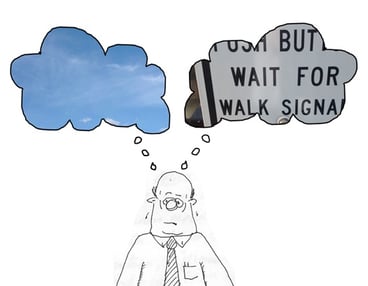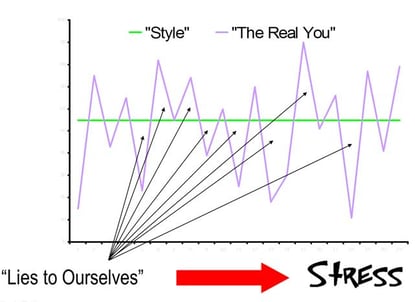I love when blog topics come directly from reader tweets and questions, as does today’s. Simon Oliver responded to a tweet on a previous article (“Step 1: Strategy, Step 2: Wild Creativity. Don’t Reverse the Order”) by asking for any signals strategizing has become procrastination.
We have covered advantages and disadvantages of strategic patience and tried letting procrastinators off the hook. We have not covered a strategic thinking exercise for diagnosing people who love strategizing so much they never seem to get around to implementing anything.
A Strategic Thinking Exercise to Judge Strategizing vs. Procrastination
From Simon’s request, here’s a strategic thinking exercise with sixteen signals to consider if you sense you, someone on your team, or perhaps your whole organization is strategizing as a form of procrastination.
 There is a history of missing opportunities by not acting in a timely fashion
There is a history of missing opportunities by not acting in a timely fashion- There’s no clear objective so the extended strategizing isn’t sufficiently focused
- You are waiting to accomplish something bigger in one step, when you could be accomplishing smaller steps moving in the right direction
- You’re spending undue time determining multiple strategies tied to market situations highly unlikely to materialize
- You are trying to figure things out to a level of precision well beyond how precisely you’ll implement the strategy or measure actual performance
- You are wasting time by NOT pursuing basic strategy planning steps
- The level of prudence you are exercising far exceeds the level of risk involved in starting
- You aren’t learning enough while waiting to make you disproportionately smarter when you act later
- You have identified a direction clearly adequate to meet your objectives but want to tinker some more
- There is no indication the current strategic answer will change after additional delay
- Your future readiness to act isn’t increasing appreciably during the delay
- You enjoy strategizing as much or more than “having strategized”
- You’re spending more time rationalizing not acting than you are identifying strategies
- Frustration with the delay is disaffecting your strategic team
- You’re working diligently on refining your strategy while discounting how much you can refine your strategy as you implement
- You’re not sensing any pressure to begin implementation
How many of these conditions does it take to signal strategizing has become procrastination?
I do not have a scientific answer for how many of these signals have to be present to indicate solid strategizing has become procrastination. Looking at one of our own strategic decisions where I’m not happy about how long it is taking us to act though, five signals are present. Evaluating a potential client opportunity that’s now languished more than a year because the client has sidelined it for a variety of reasons, there are at least six of signals present.
While it’s clearly not a definitive sampling, my starting guesstimate is if at least five or six of these signals are present, your strategizing has become procrastination.
If that’s the case with your situation, take advantage of this strategic thinking exercise to diagnose the underlying issues, address them, and get going. - Mike Brown
If you enjoyed this article, subscribe to the free Brainzooming email updates.
The Brainzooming Group helps make smart organizations more successful by rapidly expanding their strategic options and creating innovative plans they can efficiently implement. Email us at info@brainzooming.com or call us at 816-509-5320 to learn how we can help you enhance your strategy and implementation efforts.



